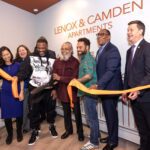PHOENIX — His rallying cry echoes the late César Chávez, the Latino activist who inspired legions with three simple words, “Sí, se puede!”
The loose translation — “Yes, we can!” — has become Barack Obama’s call to arms.
But now, some are asking: Can he?
After a dismal showing among Hispanics in his Super Tuesday showdown with Hillary Clinton, can Obama entice this key voting bloc? And if not, what might that say about a color divide that extends beyond black-white in an ever-expanding brown America?
Going forward in a neck-and-neck race, the ability to win Hispanic voters will prove vital in the March 4 primary in Texas, where nearly 25 percent of eligible voters are Hispanic.
“Let’s face it,” said popular Spanish-language radio host Luis Jimenez, “Hispanics will vote for a woman president before voting for someone who is African American.”
While the overall tally of Super Tuesday’s string of contests was hardly conclusive in determining the ultimate Democratic presidential nominee, the results among Hispanics spoke volumes. Clinton, exit polls showed, won 63 percent of Hispanic voters, helping propel her to victory in places like Arizona and California, where a whopping 67 percent of Hispanics backed her.
Even in Obama’s home state of Illinois, where he soundly beat Clinton, polls showed he merely split the Latino vote.
Is this about familiarity, a Johnny-come-lately strategy and a shortage of big-name Latino endorsements, or something less tangible and more provocative — a reluctance among Latinos to support a black candidate?
The suggestion inflames Federico Peña, who served in President Clinton’s cabinet and now sits as a national co-chair for the Obama campaign.
“That would say that Hispanics are racist. We are not,” he said. “What is really going on here is that Hispanics simply don’t know this candidate, and he happens to be African American, and he happens to be named Barack Obama.”
Louis DeSipio, a political scientist who chairs the Chicano studies program at the University of California, Irvine, agreed: “It’s not a rejection of Sen. Obama. It’s an affirmation of their support for Sen. Clinton.”
Clearly, Clinton had advantages over Obama that had nothing to do with color.
She is well known and well liked among Hispanic voters who remember fondly her husband’s presidency and the inclusion of Latinos such as Peña. She won coveted — and early — endorsements of prominent Hispanics, including Los Angeles Mayor Antonio Villaraigosa and Dolores Huerta, who co-founded the United Farm Workers with Chávez.
She also got a jump-start wooing Hispanic voters on the ground and on the airwaves, while Obama’s initial underdog status had him focused on early contests in Iowa, New Hampshire and South Carolina.
“Hillary Clinton has a long relationship with the Hispanic community … based on her work but also her husband’s presidency, so it’s not surprising that Hispanics went for her more than Obama,” said Susan Minushkin, deputy director of the nonpartisan Pew Hispanic Center. Minushkin was, in fact, surprised that Clinton’s numbers among Hispanics weren’t even higher.
A December survey by the center found Democratic-leaning Latinos who were registered voters overwhelmingly supported Clinton. Still, that same survey found that Obama drew more support among those voters than New Mexico Gov. Bill Richardson — a Hispanic who speaks Spanish fluently and who lived more than a decade in Mexico City.
A November Pew study found that 74 percent of Hispanics who were familiar with Obama regarded him favorably. However, the percentage of those polled saying they had never heard of Obama, or were unable to rate him, was higher among Hispanics than blacks or whites.
Still, others wonder whether such surveys accurately reflect the reality on American streets, where tensions among blacks and Hispanics have increased in past years as Hispanic immigrants pour into inner-city neighborhoods, competing with their black neighbors for jobs, housing, services — and a seat at the table on local school boards and town councils.
Hispanics have surpassed blacks as the nation’s largest minority, comprising about 15 percent of the U.S. population today.
“We’ve been fighting in this country for our place — and so is every minority,” Jimenez said, surmising that Hispanics’ Super Tuesday snubbing of Obama stems from viewing him as “a competing minority rather than a serious candidate for president.”
Mistrust fueled by racial stereotypes may also contribute, along with prejudices that may have first formed in the class-driven societies of some Hispanics’ native lands, where darker-skinned indigenous citizens are sometimes looked down upon by those with lighter skin and a Spanish heritage.
Armando Navarro heard mentions of race when trying to convince friends to vote for Obama. Navarro teaches ethnic studies at the University of California, Riverside, and is coordinator of the National Alliance for Human Rights, a Hispanic activist organization.
Color, he said, while not “the” factor in the Super Tuesday results, was “a” factor.
“It stems from our own experience as a people,” he said, but also that competitiveness that Jimenez cites — “the fear that with a black president, ‘they’re’ really going to be in and ‘we’re’ going to be out.”
Consider the view of another voter, Gustavo Sanchez, a Los Angeles painter originally from Mexico.
“Obama is African American, so his support would naturally come more from blacks. And I think he would support blacks more,” said Sanchez, who voted for Clinton in the California primary.
Sanchez said tension between blacks and Hispanics wasn’t a factor in his choice, but that it likely weighed on some people.
Others, especially younger Latino voters, dismissed the idea of a divide driving election-time decisions.
“Latinos who are under 40, we have black friends and we have colleagues,” said Miguel Orozco, a thirty-something in Los Angeles who launched “Amigos de Obama” last year to help introduce Obama to Hispanic voters. “We don’t see that whole friction or divide or whatever. That wouldn’t be a reason why folks I know would not support Obama. They just don’t know what he’s about.”
When the nation’s largest daily Spanish-language newspaper, Los Angeles-based La Opinión, endorsed Obama as the Democratic choice, letters and phone calls streamed in from readers wanting to know why, said editorial page editor Henrik Rehbinder.
A few readers described “a bad experience” with blacks, or worried a black president wouldn’t care as much about Latinos and their issues. But most complained — as Orozco suggested — they simply didn’t know enough about the senator from Illinois. They weren’t aware of his stance in support of giving driver’s licenses to illegal immigrants, or his history as the son of a Kenyan immigrant.
“The question is: ‘What did he do?’” said Rehbinder. “When you don’t know a person, you operate by stereotypes. That was a big difference … between a candidate who is very well known and somebody who is a trend now but very new — and Latinos don’t really go for it. They need a bit more.”
That “comfortability” is especially important to Hispanic voters, said Earl Ofari Hutchinson, a black political activist and the author of several books on race and politics.
“Hispanics have to be absolutely sure there’s no tilt toward African Americans, that they’re going to be a clear advocate and a clear champion for Latino interests,” he said. “It’s pretty difficult, particularly on short notice, to break that down. You’ve got to spend time on the ground in these communities — up close and personal.”
Obama and Hispanic advisers such as Peña seem to have grasped that. A few days before the Super Tuesday primaries, the campaign dispatched Sen. Edward M. Kennedy to Hispanic centers in New Mexico. And Obama himself addressed the so-called black-brown divide during an appearance in Los Angeles. “Cynical talk,” he called it — the kind he hopes to move past.
Peña insisted Obama already is.
Look at Colorado, he said, where nearly 12 percent of the electorate is Hispanic. Obama won that state on Super Tuesday. Even in Arizona, where Clinton won the Hispanic vote, the tilt was less than it was in California — 55 percent to Obama’s 41.
Peña pointed to Obama’s own growing list of Latino supporters — among them Maria Elena Durazo, head of the powerful Los Angeles County Federation of Labor, and U.S. Rep. Linda Sánchez, who represents communities south of Los Angeles — and promised more endorsements were on the way.
Obama also will be spending more time with Latinos in Latino communities, Pena said, especially as the Texas contest nears.
“When Barack has the time, and when we have an opportunity to physically present him, he gets very strong support in the Latino community,” Peña said. “Our race is a race against time.”
Associated Press writer Peter Prengaman contributed to this report from Los Angeles.
(Associated Press)






